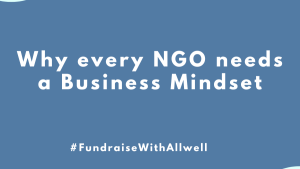African nonprofits are at the heart of the continent’s push for development. Africa is a continent blessed with abundant human and natural resources, which has suffered from lackluster leadership, mismanagement of resources, and corruption. Bad governance, growing populations, and widening inequalities across the continent have made non-governmental organizations (NGOs) key players in catalyzing development, particularly for marginalized populations.
NGOs play various roles such as holding the government and other stakeholders accountable, initiating and providing services to marginalized peoples and communities, advocacy, and capacity building among others. However, these NGOs are often underresourced with limited capacities and support from within their communities. They sometimes face mistrust from their governments and often have to contend with shrinking civic spaces. In addition, the international development system is skewed against them with a preference for international non-governmental organizations (INGOs) who get the majority of the funding and can develop strong relationships with Western donors.
Financial sustainability refers to the ability of an organization to generate resources that guarantee its operations both now and in the future. It enables an NGO to continue to deliver on its mission to its beneficiaries and maintain consistency in its impact. Sustainability is crucial as NGOs, by definition, are not profit-seeking and rely on the goodwill of various stakeholders to believe in their mission and support them with the resources to act upon it. Thus, without financial sustainability, an NGO is in danger of folding up and failing to have a lasting impact on mitigating the problem it has set out to solve for its beneficiaries. There are three crucial reasons why African NGOs need to plan for and attain financial sustainability.
- Stay true to your needs/mission
African NGOs are the best placed to make an impact in the communities that they serve. They come from the local communities, better understand the context, and are committed for the long term to work towards resolving the thorny problems that they face. Yet, they are sidelined by Western donors with less than 10% of USAID funding getting to them while INGOs gulp the rest. Donor priorities are fickle and change rather frequently. Their funding is tied to these priorities and African NGOs have to respond directly to those priorities to get funding irrespective of whether those are the actual needs on the ground.
Financial sustainability enables the African NGO to stick to addressing the core problems it is trying to solve and avoid bending over to the external donor’s whims and caprices. It also helps the NGO to confidently choose which donors are most relevant to work with to attain its mission. Thus, the empowered local NGO would not jump on every funding opportunity out of desperation when it is not a right fit. By keeping the needs of its community square and center, the NGO can better serve its community.
- Consolidate on your impact
Donor funding is often short-term project funding. Project cycles are typically 1-3 years with multi-year funding beyond 3 years getting quite difficult to secure. In most instances, funders cover only a small fraction of the overhead costs that are required to keep the organization running.
The situation is more complicated for African NGOs who often are relegated to minor sub-partners or subcontractors of INGOs in funded consortiums. They work on short-term activities across various projects that could be disparate and not coherently contribute to their impact. Moreover, external events such as the wars in Ukraine and Gaza and changing donor trends such as directing funding designated for external aid or Overseas Development Assistance (ODA) internally to cater to refugees have abruptly cut funding for projects run by African NGOs.
A financially sustainable African NGO will design and implement comprehensive programs that bring it closer to achieving its intended impact over time. Such an NGO can focus its energies on implementing programs that support the community for the long term. It can also follow through on the short-term outcomes until they transform into the desired impact.
- Secure the holistic support of the community
A financially sustainable African NGO will be able to secure and harness the holistic support of its local community for its work. A by-product of the donor-driven system is that African NGOs may inadvertently sideline the local communities during program design as they rush to respond to deadlines for calls for proposals. Such a situation means there is less time to consult local communities to identify the actual problems, co-create the solutions, and get their buy-in before developing those projects.
However, a financially sustainable NGO will take measures to be properly rooted in the local communities that they serve and harness their financial and material resources to truly lead development that is inclusive and more impactful. The communities and relevant stakeholders would perceive the NGO as an extension of themselves and work to ensure its success and sustainability.
In conclusion, financial sustainability is crucial for African NGOs. It is important to plan for and work towards it to enable the NGO to stay true to its mission, consolidate its impact, and secure the holistic support of the community that it serves. To be financially sustainable, the African NGO needs to diversify its funding, seek unrestricted funding, build its financial reserves, and secure the full support of its local community stakeholders.
Allwell Akhigbe
Co-Founder and CEO
Travaille Ensemble



